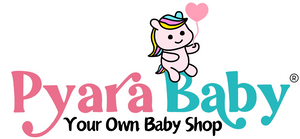NEWBORN MYTHS
-By
Misbah
As parents, we desire to look after our infant in the best and most efficient way possible. Raising a newborn can be difficult for a first time parent. We ask our parents, acquaintances, and the internet for advice.
However, some of this suggestions are logical while others are not, but we always abide by them. Because all we want is to nurture our child in a happy and healthy environment.
But at times, figuring out what is true and what isn’t can very problematic.
To debunk popular myths about newborns, continue reading.
1.Myth: A strict routine for feeding newborn has to be followed.
Fact: Infants need to consume frequently, typically every two to three hours, due to their small stomachs. Instead of following a strict timetable, it's extremely important to feed a newborn whenever they exhibit signs of hunger.
2.Myth: Water should be given to infants as well.
Fact: Before the age of six months, babies do not require water. They can be provided water once they begin solid food after six months. Before this, breast milk or formula offer all the hydration a baby needs.
3.Myth: Each day, newborn should be bathed.
Fact: It is not necessary to bathe a newborn everyday, a frequent bathing can dry out their skin. Instead, it's advised to give a baby a sponge bath a couple of times per week and to completely clean their diaper area after each diaper change.
4.Myth: Teething causes fever.
Fact: Babies' fevers are not caused by teething. While some babies may experience a small rise in body temperature while teething, it is not considered as a fever and is usually of no concern. Although teething can make babies uncomfortable and irritable, temperature is not a direct result of teething.
5.Myth: Applying Kajal or Surma to infants' eyelids is beneficial.
Fact: Newborns have sensitive, easily infected eyes, and the introduction of foreign substances can irritate their eyes and cause infections or allergies. It is not advised to use surma or kajal on a newborn's eyes.
6. Myth: Sneezing indicates cold.
Fact: Among infants, sneezing is a typical reflex that helps to clear the nasal passage of mucus, dust and other irritants. Especially in the first few weeks of life, it can happen frequently and is a typical component of a baby's respiratory system. Before self medicating , seek medical advice if you are worried about the health of your infant.
7.Myth: Babies should be given honey at birth.
Fact: Honey or any other sweetener shouldn't be provided to newborns. In reality, because of the potential danger of infant botulism, it is advised that honey not to be given to babies under the age one. Infants should be provided breast milk or formula as soon as they are born rather than these sweeteners.
8. Myth: Baby walkers will assist them in learning to walk sooner.
Fact: Baby walkers can prevent a baby from learning to walk and lead to other developmental issues. Baby walkers may appear to be a practical method to help a baby move around and explore their environment, but they can actually impede the child's normal motor skill development. With the help of baby walkers, infants can move around without using their own muscles to support their weight, which can postpone the growth of the muscles and coordination required for walking.
Babies can gain the muscle and coordination necessary to master self-balancing walking by engaging in tummy time, crawling, and supervised floor play.
Keep in mind that being a new mother is a learning process, and that you will keep learning and developing as you take care of your child.
Enjoy this unique time with your child, but don't neglect your own requirements as well or let unfounded myths and beliefs impact you.


